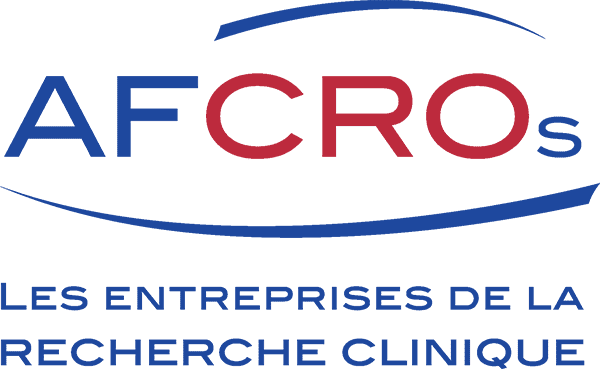Attractiveness
Objectives of the group
To contribute to the attractiveness of France for the realization of Clinical Research (CR) on its territory:
- Increase the number or proportion of studies (CR) carried out in France ;
- Promote the know-how of French companies (especially CROs, digital health actors) in France and abroad.
Operation
The group meets every 4 to 6 weeks by teleconference or face-to-face.
Actions
- Drafting of a sales pitch in English including all the advantages of France and French companies that can be used by all the players, possibly distributed by our French clients to their parent company,
- Production of regular indicators on the evolution of CR activity (AFCROs Barometer), measurement of perception and effects through stakeholder surveys,
- Lobbying clients, authorities and institutions in France, Europe and other regions,
- Speaking engagements, press conferences, articles, participation in meetings in France and abroad with the support of support structures (Business France,…),
- Active integration in initiatives (#ChooseFrance,..),
- Representation (chairmanships, presentations) at professional days/meetings,
- Joint or coordinated actions with other institutional and private players (F-CRIN, LEEM, SNITEM, SYNTEC, etc.).
Group Members
- Christophe CLEMENT | ICTA
- Denis COMET | Axonal-Biostatem – Animateur
- Laetitia GIDELLE | PSI CRO
- Viviane GUERMONT | Biotrial
- Hubert MECHIN | InAdvans
- Baptiste MENGUY | Evamed
- Michel PAUTRAT | Cell & Co
- Johann TRUCCOLO | PRAHS
Contact : groupe-attractivite@afcros.com
On the occasion of the 8th Clinical Research Day which takes place on January 31, 2019 in Paris, AFCROs presents the second edition of its Barometer of Clinical Research in France. This tool produced by the working groups of the French Association of Clinical and Epidemiological Research Companies aims to provide an overview of clinical research in France and its recent developments. The sector is dynamic with 18,000 employees and has an employability rate of 95% for Clinical Research Associates (CRAs) at the end of their training.
The AFCROs barometer shows that France remains the leading country for clinical research in Europe. Across all types and products combined, the number of ongoing clinical studies in Europe increased by 9%, with more than 6,730 additional studies registered on the Clinicaltrials.gov database and initiated between 2017 and 2018. France shows an increase of 9.9%, with 1,885 additional studies listed in the database between 2017 and 2018. France alone will account for nearly 25% of the studies initiated in Europe in 2018 and remains several steps ahead of the United Kingdom (1,148), Germany (932), Spain (904) and Italy (727).
These a priori favourable figures nevertheless mask disparities and much more contrasted realities which show a drop in the number of clinical research projects initiated in France between 2017 and 2018. In 2018, it is the studies with academic promotion, all products and all types of studies taken together, which represent the ¾ of the clinical research activity. While more than two thirds of the studies conducted in France are intervention studies, 2018 was marked by a significant decline in industrially-initiated intervention studies. This decrease was not offset by the slight increase in academic initiative studies (+1.5%) and resulted in an overall decrease of 6% in intervention studies conducted in France.
Observational research remains stable but these studies, mostly initiated in the academic world and few (or few recorded in Clinicaltrials.gov) in industrial promotion, represent a third of the research conducted in France.
The industrial research activity, which is the most direct reflection of France's attractiveness, remains in difficulty," emphasizes the president of AFCROs, Denis Comet. The numerous regulatory changes in 2018, with their corollaries of delays in implementation, have probably had a negative impact on the launch of new studies, particularly in the case of intervention studies that are subject to the opinion of the Personal Prevention Committees (CPP)".
Attractiveness to be rediscovered and developed
This year, the barometer includes a new component with a survey conducted among AFCROs members on the criteria contributing to France’s attractiveness for clinical research. Its results indicate that the recognized expertise of French KOLs is France’s major asset, just ahead of the Research Tax Credit, which authorizes a 30% reduction in research spending up to 100 million euros, and the Single Hospital Agreement (CUH), which has reduced the time it takes to sign contracts with hospitals. Then there is the existence of a single Ethics Committee and the processes for early access to therapeutic innovation (Temporary Use Authorisation (TUA), Temporary Recommendations for Use (TRU)…) for patients with serious diseases. The number of patients treated with cohort TUA or nominative TUA increased by 15% between 2015 and 2017 to 24,871.
France’s attractiveness is also closely linked to the pursuit of measures to simplify and standardise its regulatory processes.
Once the measures to adapt our regulatory processes have been integrated, France should regain and increase its attractiveness in Europe," says Denis Comet. On the one hand, the structuring of academic research and the setting up of support programmes and systems provide real support to the overall activity of clinical research. On the other hand, the joint work of all those involved in clinical research (public authorities, institutions, health industries and clinical research companies) has made it possible to identify the obstacles and define the levers that will enable us to develop our attractiveness in the years to come. The law of 17 October 2018 has just modified the procedure for choosing CPPs. It will allow us to move from a random draw to a draw taking into account the skills acquired and the availability of the PPCs. We will of course be vigilant with regard to its implementing legislation, just as we are closely monitoring the implementation of the new European regulation on medical devices, in line with our commitments of responsibility, transparency and ethics for safe access to therapeutic innovation for all patients".
Attractiveness
Acting with and with all stakeholders to make France an attractive country for Clinical Research
Medical devices
French expertise on the clinical evaluation of medical devices
Clinical Research Professions
Promote clinical research careers among students and professionals
Real world data
French expertise on real life primary and secondary data
AI & Clinical Research
Use of Artificial Intelligence to serve our CRO professions
Patients and Clinical Research
Patients at the heart of clinical research
Regulatory
single convention
Monitor the use of the single convention
Regulatory
CPP-ANSM
Follow the regulations relating to study authorization requests
Regulatory
CNIL-RGPD
Follow health data protection regulations
Human vigilance
To develop and share good practices for the professional achievement of Clinical Research staff
Decentralised clinical trials
Reflections on the creation of an agile and secure methodology for the development of decentralised clinical trials in France.

